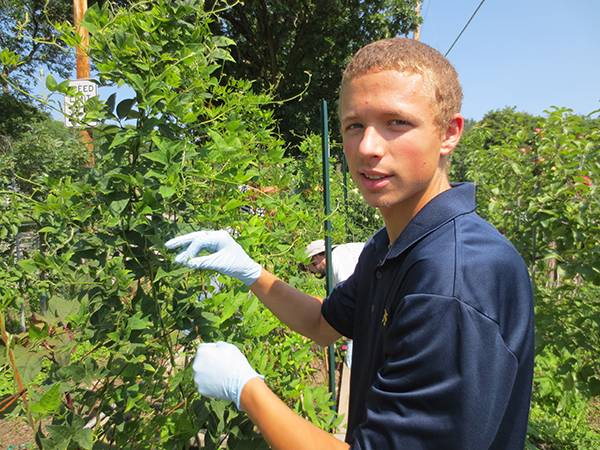Search
Dakota Lyddon was a USDA/World Food Prize Wallace-Carver Fellow during the summer of 2014. He worked a the USDA-ARS Corn, Insects and Crop Genetics Research Unit on the Iowa State University campus in Ames, Iowa.
 |
| Dakota Lyddon at the USDA research facility in Ames, Iowa |
Standing in the middle of an unruly community garden, his hands are lost in a network of green vines snaking along trellises. He finds a small, fuzzy bud and gently pinches it off the plant, laying it on a piece of foil.
“This is a potato-bean plant,” he said happily. “We’re adding a new crop to the global food crisis.”
Dakota Lyddon is 18 years old, and he already knows agriculture is the field for him. The recent graduate of Hoover High School and Central Campus in Des Moines, Iowa, was active in FFA and competed in soil contests and the agricultural issues forum at the National FFA Convention. He has participated in World Food Prize events for years, attending both the Iowa and Global Youth Institutes and meeting experts and leaders from all over the world.
This summer, Dakota is one of 33 students selected for the USDA Wallace-Carver Fellowship program, which allows him to spend several months as an intern at the USDA-ARS Corn, Insects and Crop Genetics Research Unit on the Iowa State University campus. Dakota didn’t think twice before signing up to work at the largest center for plant research in the nation.
“Plants just fascinate me,” Dakota said. “They’re the beginning of everything in the world. They give us food – but so much more.”
Dr. Steven Cannon, Dakota’s supervisor at the USDA lab, told him right away that he would be working on something particularly important – a long-term food security project.
“He told me about the impact I’d be making,” Dakota said. “I got right to it.”
Dakota has worked in the lab since early June, mapping a pedigree chart for the potato-bean plant, a drought- and flood-resistant plant that produces both tubers and beans. Dakota explained that the pedigree chart is essentially a “family tree” of the different genetic strains of the plants.
Plant scientists have been working with the potato-bean since 1985, experimenting with various genes in order to develop the healthiest, most productive plant. Because of its sturdiness and disease-resistance, they hope it will become a commercial crop, enhancing global food production.
“This plant has both beans and tubers,” Dakota said. “This could make a lot of money and feed a lot of people.” Dakota said he and his fellow researchers visit the community garden regularly to harvest samples from the potato-bean. The small Ames plot is owned and maintained by Cannon but shared among Ames community members. Frequently the team has to chase out hungry rabbits.
At the USDA lab, Dakota and several researchers have been regularly collecting samples – or “harvesting tissue” – from the potato-bean plant in order to conduct gene sequencing.
“Before this internship,” Dakota explained, “’gene sequencing’ wasn’t even in my vocabulary.”
But by now, he can easily explain the process: Scientists extract RNA from the nuclei of the plant cells, looking for patterns. Then, they use these patterns to identify certain characteristics of particular plants, such as the height of the plant or the distance between its leaves.
“By sequencing the genes, you can learn what area of the gene you can manipulate to get the ideal commercial crop,” Dakota said. “You can do that through selective breeding or genetic modification.”
This is the kind of work that will help feed the growing world population, estimated to reach 9 billion by the year 2050, and it’s the work Dakota wants to be doing for the rest of his life.
“My main goal is decreasing the amount of people who are hungry in the world,” Dakota said. “That’s the bottom line.”
Never before has Dakota felt like so many opportunities are available to him. Because of his World Food Prize experiences, he has connections with agriculture professionals around the country – and many more ideas about potential career paths he might take.
Dakota plans on attending DMACC this fall and after two years, he will transfer to Iowa State University and major in horticulture and global resource systems. Someday, he thinks he might even want to work for the World Food Prize. But winning the Prize isn’t important to him.
“It’s not about getting the World Food Prize,” Dakota said. “I don’t care about being famous or winning prizes. I just want to make an indent in the world.”


